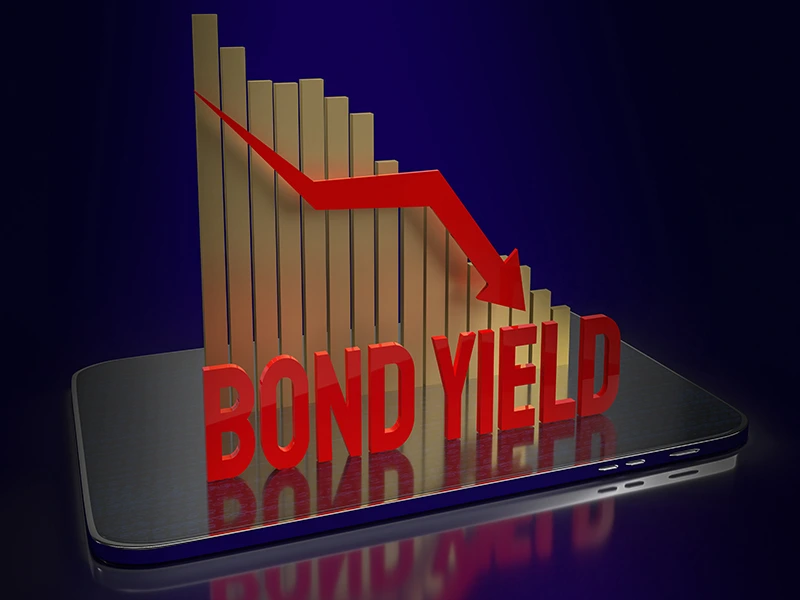
A bond is a fixed income instrument issued against a loan by a corporation or a government agency. Just like you borrow from banks/other institutions, companies or government agencies also borrow from individuals/corporations to fulfill their needs. Just like a share represents a unit of ownership of the company, a bond represents the loan lent to the borrower. Therefore, bonds are units of debt that are issued by companies and can be traded just like stocks.
What is bond and bond yield?
A company may issue bonds to raise funds for business continuity. In return for the bonds, companies pay regular and fixed interest to the bondholders. The interest paid towards bonds is known as the coupon rate. It is based on the face value of the bond and is fixed until the bond’s maturity. However, interest is not the only return to be expected from bonds. Since bonds are tradeable, they can also fetch returns known as bond yields.
What is bond yield and what does rising bond yield mean?
In return for lending money through bonds, bond issuers agree to pay the investor an interest amount through the lifetime of the bond. Bond issuers must also repay the principal amount upon the bond’s maturity.
Meaning of yield
Yield is the return you get on a bond investment. Here’s is a simple example to understand yield:
Yield = coupon amount/price
Let’s suppose you buy a 10-year bond at Rs. 1,000 par value with a 10% coupon.
If you hold the investment, the issuer will pay you Rs. 100 per year (10% of Rs. 1,000) for 10 years. At maturity, you get back the Rs. 1,000 that you invested.
Therefore, the yield will be 10%, which is calculated as (Rs. 100/ Rs. 1,000).
Bond yield changes as per changes in prices of bonds. Suppose, if the price of the bond drops to Rs. 980 in the market, the Yield will be Rs. 100/Rs. 980 = 10.20%. On the other hand, if the bond price rises to Rs. 1,030, the Yield will be Rs.100 / Rs. 1,030 = 9.70%
How are bond yields and bond prices related?
Bond yields are inversely related to bond prices because when bond yields rise, bond prices go down. This is mainly since higher yields make the new bond a lucrative option than the older bonds that offer lower yields.
How do bond yields rise?
As investors sell bonds, bond prices decrease and bond yields rise. A higher yield is an indication of greater risk. If the yield of a 10-year bond is higher as compared to the yield at the time of issue, it is an indication that the company or government is under possible financial stress and may be unable to repay the capital.
Impact of changes in bond yields on stock markets
Opportunity cost of equities
Bond yields are crucial in the calculation of opportunity cost of equities. These are representative of the opportunity cost of equity investments.
Suppose a 10-year bond yields 7% annually. Investors will be attracted to the equity markets only if they can earn more than 7%. Since equity investments often carry higher risks, investors will also expect a risk premium to make the returns comparable to bond yields.
Let’s say that the risk premium on equities is 5%. Thus, 7% +5% = 12% will be the opportunity cost for equity. Anything below 12% will not be investor worthy and an investor may be taking higher risks while investing in equities if it is not being compensated.
As bond yields rise, the opportunity cost of investing in equities also rises. Therefore, equities may not attract inventors. This showcases the negative relationship between bond yields and stock markets.
Comparison with earnings yield
Bond yields are often compared with earnings yield. So, what is earnings yield?
Earnings yield = Earnings per share / price of the stock.
It is an indicator of a share’s earnings if an investor buys it at the current price. A stock will be attractive for an investor only if he/she can get a higher earnings yield from it than the bond yield. However, this argument may not be applicable if the company is loss making, and an investor decides to buy its stocks with the expectation that the stock performance will experience a turnaround.
Impact on cost of capital in equity valuation
Bond yields are normally used as the risk-free rate while estimating cost of capital. When bond yields rise, the cost of capital also rises. Thus, the future cash flows are discounted at a higher rate. This pushes down the valuations of such stocks which is one of the reasons why stocks perform well whenever interest rates are cut by the RBI. When a company finds it expensive to borrow money for business sustenance, its valuation is impacted alongwith its stock performance. Expensive borrowing results in lower fund availability for the company and, therefore, lower chances of declaring dividends. This is how bond yields impact equity valuation.
Conclusion
While bonds and stocks are two very different securities, both are interlinked and can impact each other’s performance. Bond yields can influence the direction of a stock market, therefore, investors must weigh their options by considering the impact of bond yields.
FAQs
Risk-averse investors can invest in bonds since these provide fixed returns over the tenure. These instruments are considered being risk free, although they do carry a certain amount of risk, albeit lower than stocks.
You get a fixed return on bond investment if it is held until maturity. However, if you sell the bond prematurely, its price could be higher or lower depending on market conditions at that time.
Yes, since portfolio diversification can help in mitigating overall risk of investment, it is important for any investor. By including a variety of instruments, such as stocks, bonds, fixed income instruments, etc, investors can gain the benefit of balanced risk and returns.
Every company must balance its debt-to-equity ratio for overall stability and sustainability. Therefore, depending on the requirement of funds, companies can issue both stocks and bonds.
Bond and stock performance often goes in opposite directions. If stocks rise, bonds may decline and vice versa.


























